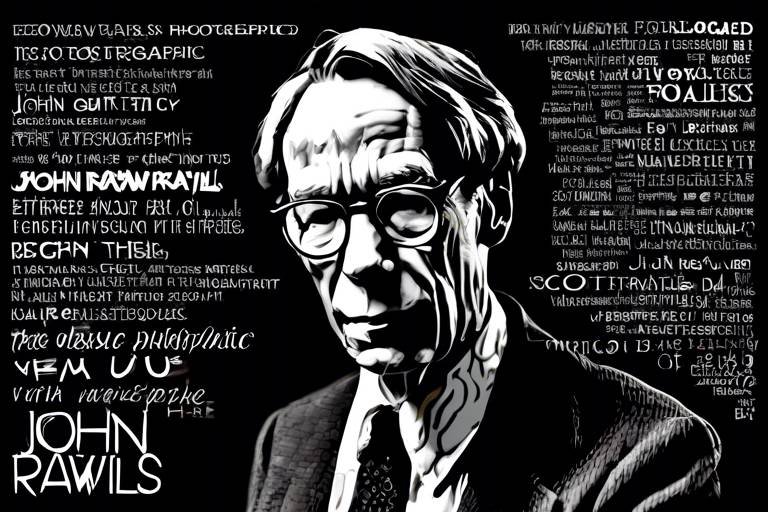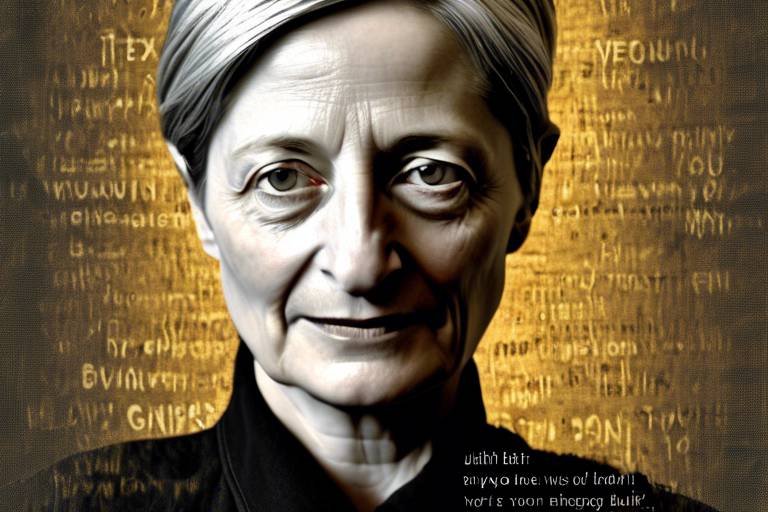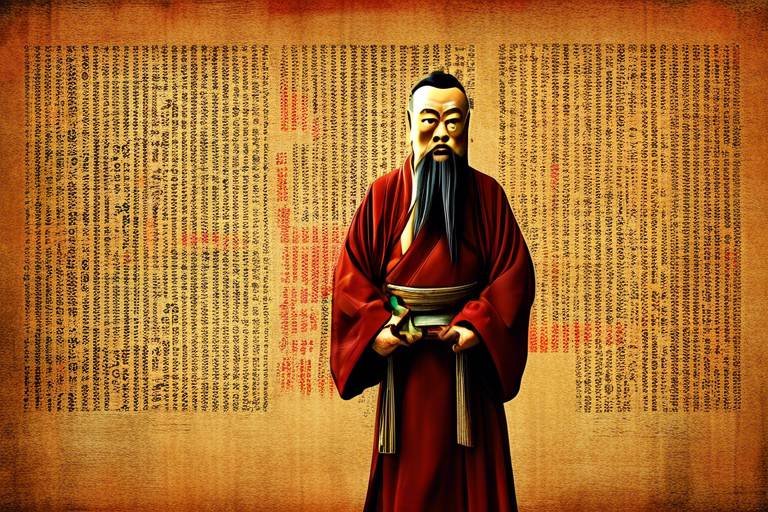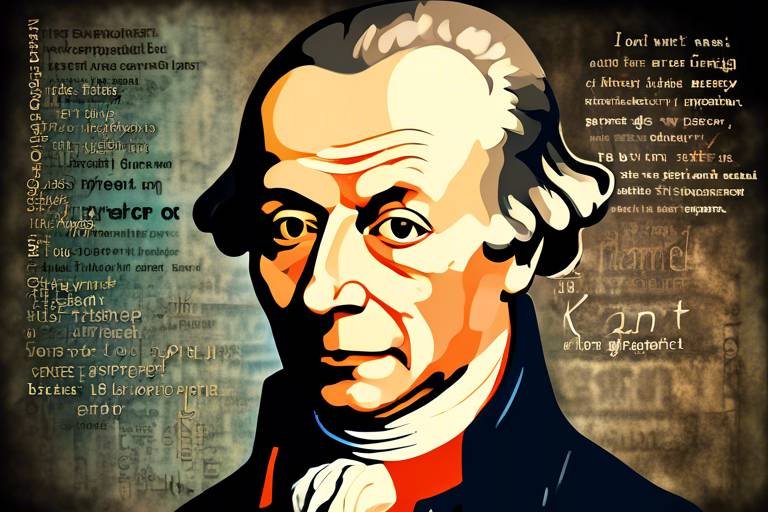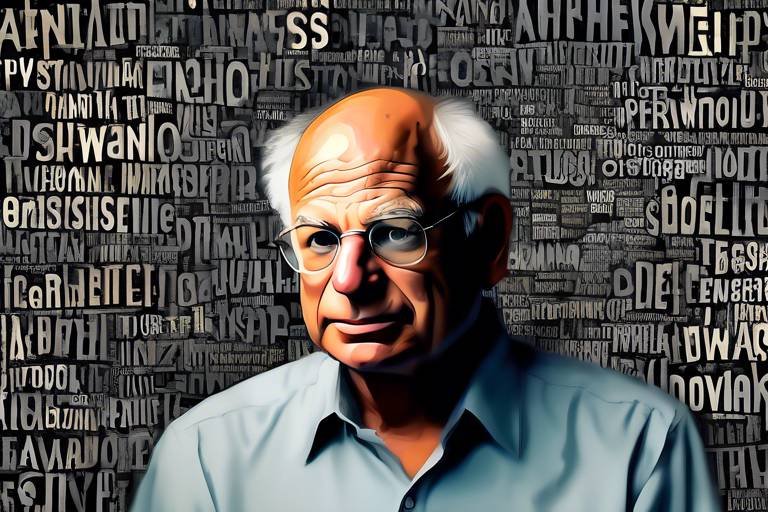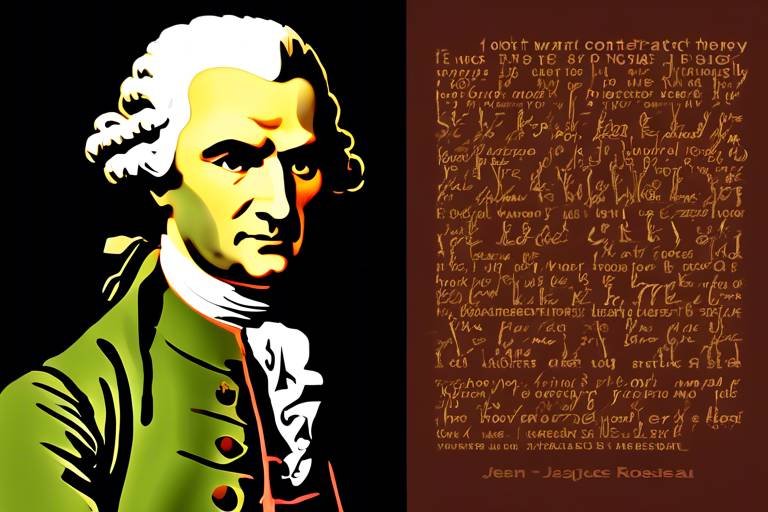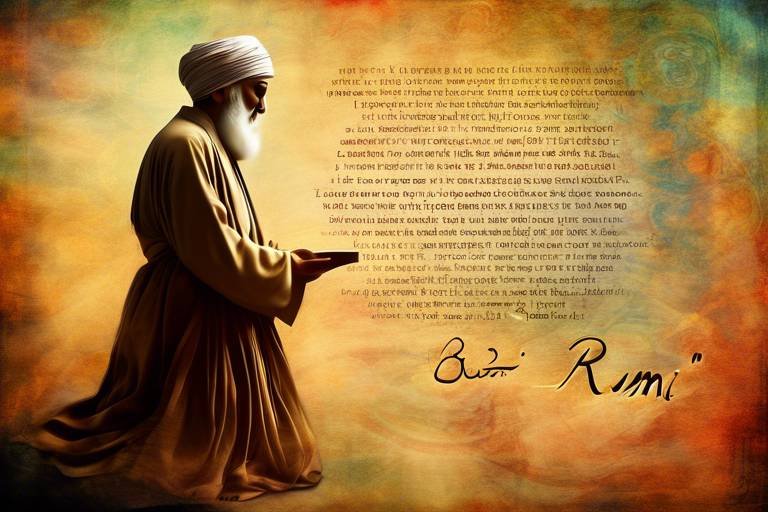The Ethical and Political Philosophy of John Rawls
John Rawls is often regarded as one of the most significant political philosophers of the 20th century, and his contributions continue to shape contemporary discussions around justice and equality. His work, particularly in his seminal book A Theory of Justice, presents a compelling vision of a just society rooted in the principles of fairness and equality. Rawls' philosophy is not just an abstract theoretical exercise; it offers a framework for understanding how we can create a society that respects individual freedoms while ensuring that the basic needs of all citizens are met. By delving into concepts like justice as fairness, the original position, and the veil of ignorance, Rawls challenges us to reconsider our notions of justice and the moral obligations we have towards one another.
At the heart of Rawls' philosophy is the idea that societal structures should be designed to promote fairness and equality. This means that while individual freedoms are essential, they must be balanced with the needs of the community. Imagine a society where everyone has the freedom to pursue their own interests, but those interests do not come at the expense of others. This is the essence of Rawls' vision: a society where justice is not just about the distribution of resources, but about ensuring that everyone has the opportunity to thrive.
Rawls’ approach to political philosophy is particularly relevant today as we grapple with issues of inequality, systemic injustice, and the challenge of creating a cohesive society amidst diversity. His ideas encourage us to think critically about how we can structure our institutions and policies to better serve all individuals, especially the most vulnerable. By incorporating Rawls' principles into our political discourse, we can work towards a more equitable and just society.
Justice as fairness is a foundational concept in Rawls' philosophy. It proposes that the principles governing the basic structure of society should be agreed upon in a fair manner. This means that societal rules should be designed to ensure that all individuals have equal access to opportunities and resources. In a world where inequalities often dictate life chances, Rawls' call for fairness resonates deeply. He argues that a just society must prioritize the needs of the least advantaged, ensuring that everyone has a fair shot at success.
To illustrate this, consider the following key aspects of justice as fairness:
- Equal Basic Liberties: Every individual should have the same basic rights and freedoms, such as freedom of speech, religion, and assembly.
- Fair Equality of Opportunity: Everyone should have equal chances to pursue their goals, regardless of their background or social status.
- Difference Principle: Social and economic inequalities are only justified if they benefit the least advantaged members of society.
This framework not only promotes individual rights but also emphasizes the importance of community and collective well-being. It challenges us to think about how our actions and policies impact others, fostering a sense of responsibility towards one another.
The original position is a thought experiment that Rawls uses to explore the principles of justice. In this hypothetical scenario, individuals come together to determine the rules that will govern their society, but they do so under a veil of ignorance. This means that they do not know their own social status, talents, or personal circumstances. By removing these biases, Rawls ensures that the principles chosen will be fair and just for everyone, regardless of their position in society.
The veil of ignorance is a powerful tool that compels individuals to think impartially about justice. Imagine if you had no idea whether you would be born into wealth or poverty, health or disability. Would you still advocate for policies that favor the privileged? The veil forces us to consider the implications of our decisions on the most vulnerable members of society, promoting a more equitable approach to governance.
Rawls' approach has significant implications for social contract theory. Traditionally, social contracts emphasize self-interest and individual gain. However, Rawls shifts the focus towards fairness and mutual respect. This redefinition reshapes our understanding of moral and political obligations, urging us to create a society that genuinely reflects our collective values.
Despite its strengths, Rawls' veil of ignorance has faced critiques. Some argue that it oversimplifies the complexities of social dynamics and fails to adequately address issues of power and privilege. Critics question whether individuals can truly detach themselves from their identities and experiences to design a just society. These discussions are essential as they push us to refine and expand upon Rawls' ideas, ensuring they remain relevant in our ever-evolving world.
Rawls articulates two key principles of justice that guide his philosophy:
- Equal Basic Liberties: Each person has an equal right to the most extensive basic liberties compatible with similar liberties for others.
- Social and Economic Inequalities: These must be arranged to benefit the least advantaged members of society.
These principles serve as a guiding light for crafting policies that promote equity and social justice, urging us to consider the impact of our decisions on all individuals, especially those who are marginalized.
Building on Rawls' foundational ideas, political liberalism advocates for a pluralistic society where diverse beliefs can coexist harmoniously. It emphasizes the need for a shared political framework that respects individual freedoms while promoting the common good. In a world rife with ideological divides, Rawls’ vision of political liberalism offers a pathway towards unity and cooperation.
The concept of overlapping consensus is crucial to political liberalism. It suggests that individuals with differing moral views can still agree on fundamental political principles. This consensus fosters a stable society that respects diversity while upholding justice and fairness. It’s like a mosaic, where each piece retains its unique identity yet contributes to a cohesive whole.
However, political liberalism is not without its critics. Some argue that it may inadequately address deep-seated injustices and fail to provide comprehensive solutions to the challenges posed by radical ideologies and societal divisions. These critiques highlight the ongoing need for dialogue and adaptation in our pursuit of a just society.
1. What is the main idea behind Rawls' philosophy?
Rawls' philosophy centers around the concept of justice as fairness, advocating for a society that balances individual freedoms with the needs of the community.
2. How does the veil of ignorance work?
The veil of ignorance is a thought experiment where individuals design societal rules without knowing their own social status, promoting impartiality in decision-making.
3. What are the principles of justice according to Rawls?
Rawls outlines two principles: equal basic liberties for all individuals and social and economic inequalities arranged to benefit the least advantaged.
4. What is political liberalism?
Political liberalism advocates for a pluralistic society where diverse beliefs coexist, emphasizing a shared political framework that respects individual freedoms.

The Concept of Justice as Fairness
At the heart of John Rawls' philosophy lies the revolutionary concept of justice as fairness. This idea fundamentally reshapes how we think about justice in society, suggesting that the structures we create should not only promote individual freedoms but also ensure that every person has an equal opportunity to thrive. Imagine a world where everyone, regardless of their background, has a fair shot at success. This is the essence of justice as fairness.
Rawls argues that a just society is one where the principles of justice are agreed upon under conditions that ensure fairness. He envisions a scenario where individuals come together to establish the rules of society, taking into account not just their own interests, but the needs of others as well. This balancing act is crucial; it acknowledges that while personal freedoms are important, they should not come at the expense of the community's well-being. In this light, justice is not merely about the distribution of resources but about creating a system that allows everyone to flourish.
To illustrate this point, consider the following aspects of justice as fairness:
- Equality of Opportunity: Everyone should have the same chance to pursue their goals, irrespective of their starting point in life.
- Fair Distribution of Resources: Resources should be allocated in a way that benefits the least advantaged members of society, ensuring that no one is left behind.
- Respect for Individual Rights: While promoting the common good, individual liberties must be protected and respected.
Rawls' vision challenges us to think critically about our societal structures. Are they truly fair? Do they provide equal opportunities for all? By advocating for a system that prioritizes fairness, Rawls pushes us to reconsider our moral obligations to one another. He invites us to imagine a society where justice is not a privilege for the few, but a fundamental right for everyone.
In essence, justice as fairness is a call to action. It asks us to reflect on our values and to strive for a world where equity and compassion guide our decisions. As we grapple with issues of inequality and injustice today, Rawls' philosophy serves as a beacon, reminding us that a fair society is not just a dream, but a goal we can work towards together.

The Original Position
The original position is a fascinating concept in John Rawls' ethical and political philosophy that serves as a foundational element in his theory of justice. Imagine a scenario where individuals are tasked with designing the rules of society, but there's a catch: they must do so without knowing their own personal circumstances. This thought experiment, known as the original position, is a powerful tool that compels us to think deeply about fairness and equality in our social structures.
In this hypothetical scenario, individuals are placed behind what Rawls calls the veil of ignorance. This veil strips away all knowledge of personal characteristics such as race, gender, wealth, or social status. The idea is to create a level playing field where everyone is treated equally, allowing for the development of principles that are just and fair for all members of society. By removing personal biases, the original position encourages individuals to consider the needs and rights of others, fostering a sense of empathy and collective responsibility.
But why is this important? Well, the original position challenges us to think about justice not just from our own perspectives, but from a universal standpoint. It raises essential questions: What kind of society would we want to live in if we didn't know whether we would be rich or poor, healthy or sick? This approach leads to the creation of principles that prioritize the well-being of the least advantaged, ensuring that societal rules are designed to uplift everyone, particularly those who are marginalized.
To better understand the implications of the original position, we can break down its core components:
- Impartiality: By ensuring that no one knows their social status, the original position promotes impartiality in decision-making.
- Fairness: The principles chosen in the original position are meant to be fair to all, aiming for equality and justice.
- Collective Well-being: The focus is on the welfare of the entire community rather than individual self-interest.
This thought experiment has significant implications for how we understand social contracts and justice in contemporary society. It encourages us to rethink our moral obligations and challenges us to create systems that are equitable and just. However, it’s not without its critiques, as some argue that it may oversimplify the complexities of social dynamics and power structures. Nevertheless, the original position remains a vital concept in political philosophy, pushing us to reflect on how we can create a more just and fair society.
- What is the original position? The original position is a hypothetical scenario proposed by John Rawls where individuals design the principles of justice without knowing their personal circumstances, ensuring impartiality.
- How does the veil of ignorance work? The veil of ignorance removes all knowledge of personal attributes, compelling individuals to consider fairness and equality when establishing societal rules.
- Why is the original position important? It encourages a broader perspective on justice, ensuring that societal structures benefit everyone, particularly the least advantaged.

The Veil of Ignorance
The veil of ignorance is one of the most intriguing concepts introduced by John Rawls in his quest for a just society. Imagine a world where you don’t know if you’ll be born rich or poor, healthy or sick, male or female, or even in a peaceful country or a war-torn one. This thought experiment forces us to strip away our personal biases and societal advantages, compelling us to think about justice in an entirely new light. When individuals design the rules of society without any knowledge of their own circumstances, they are more likely to create fair and equitable systems that benefit everyone.
To better understand the veil of ignorance, consider it like a game of roulette. If you were to bet on a number without knowing where the ball would land, you would want to ensure that your bet is as fair as possible. In the same way, when we are behind this veil, we are motivated to create a society that offers equal opportunities and protections for all, regardless of our eventual position within it. This concept encourages us to prioritize the welfare of the most disadvantaged, leading to the creation of policies that uplift rather than oppress.
However, it’s essential to recognize that while the veil of ignorance provides a powerful framework for thinking about justice, it also raises some critical questions. For instance, can we truly remove all biases? Are there aspects of identity that are so ingrained that they cannot be ignored? Critics argue that the veil may oversimplify complex social dynamics and fail to adequately address issues of power and privilege. They point out that even in a hypothetical scenario, the reality of systemic inequalities continues to loom large. Thus, while the veil of ignorance is a compelling tool for envisioning a just society, it must be applied carefully and thoughtfully.
In conclusion, the veil of ignorance serves as a vital philosophical tool that challenges us to think beyond our immediate circumstances and consider the broader implications of our choices. It invites us to imagine a world where justice is not just an ideal but a reality, shaped by the collective understanding of fairness and equality. As we engage with this concept, we are reminded of our moral obligations to one another and the importance of striving for a society that truly reflects these values.
- What is the purpose of the veil of ignorance? The veil of ignorance aims to eliminate personal biases when considering the principles of justice, ensuring that societal rules are fair for everyone.
- How does the veil of ignorance relate to social justice? It encourages the creation of policies that prioritize the least advantaged, promoting equity and fairness in society.
- Are there criticisms of the veil of ignorance? Yes, critics argue that it may oversimplify complex social dynamics and fail to address systemic inequalities effectively.

Implications for Social Contract Theory
John Rawls' philosophy significantly reshapes our understanding of social contract theory, a framework traditionally dominated by notions of self-interest and individual bargaining. By introducing the concept of justice as fairness, Rawls invites us to consider a more altruistic approach to societal agreements. Imagine a world where individuals come together not just to protect their own interests but to establish a system that benefits everyone, especially the most vulnerable. This idea stands in stark contrast to the classical view, which often prioritizes the needs of the powerful over those of the marginalized.
In Rawls' view, the social contract is not merely a transaction but a moral commitment to a collective good. His emphasis on fairness prompts us to rethink the principles underlying our social contracts. Instead of viewing society as a battleground for individual gains, we can see it as a collaborative effort to create a just community. This shift in perspective encourages us to ask tough questions about our current systems: Are they truly serving the common good? Are they equitable?
Moreover, Rawls' approach highlights the importance of moral obligations in a diverse society. He argues that a just society must accommodate various beliefs and values while ensuring that basic rights are upheld. This principle serves as a guide for policymakers, urging them to craft laws and regulations that reflect the diverse tapestry of society rather than the interests of a select few. The implications of this are profound, as they challenge us to build institutions that are not only fair but also inclusive.
However, embracing Rawls' vision requires us to confront uncomfortable truths about our existing social contracts. For instance, we must acknowledge systemic inequalities that persist in our societies. The traditional social contract often neglects these issues, leading to a status quo that benefits the privileged while leaving others behind. By re-evaluating our social agreements through Rawls' lens, we can work towards dismantling these inequities, fostering a society where everyone has a fair shot at success.
In summary, the implications of Rawls' philosophy for social contract theory are both challenging and enlightening. They compel us to redefine our understanding of justice and to seek a more equitable society. As we navigate the complexities of modern governance, Rawls' insights remind us that true justice is not just about individual rights but about creating a system that supports the well-being of all.
- What is Rawls' concept of justice as fairness?
Rawls' concept of justice as fairness suggests that societal structures should be designed to ensure fairness and equality, balancing individual freedoms with the needs of the community.
- How does the original position work?
The original position is a hypothetical scenario where individuals determine the principles of justice without knowing their own social status, ensuring impartiality in decision-making.
- What are the critiques of the veil of ignorance?
Critics argue that the veil of ignorance may oversimplify complex social dynamics and may not adequately address issues of power and systemic inequalities.
- What is political liberalism in Rawls' philosophy?
Political liberalism builds on Rawls' ideas, advocating for a pluralistic society where diverse beliefs coexist under a shared political framework that respects individual freedoms.
- How does overlapping consensus contribute to a stable society?
The overlapping consensus allows individuals with differing moral views to agree on political principles, fostering a stable society that respects diversity while upholding justice.

Critiques of the Veil of Ignorance
The veil of ignorance is a fascinating concept introduced by John Rawls, designed to promote fairness in the construction of societal rules. However, it has not escaped scrutiny. Critics argue that while the veil aims to eliminate personal biases, it may oversimplify the intricacies of real-world social dynamics. For instance, how can one genuinely detach from their identity—be it race, gender, or socio-economic status—when forming principles of justice? This thought experiment, while enlightening, raises questions about its practical application in a world rife with inequality and privilege.
One significant critique revolves around the assumption that individuals can be entirely impartial. In reality, our identities shape our perspectives and values. Critics suggest that the veil of ignorance may lead to a disconnect from the lived experiences of marginalized groups. This disconnect could result in principles that, although theoretically just, fail to address the specific needs and challenges faced by those who are disadvantaged. For example, if individuals behind the veil of ignorance do not adequately consider the historical context of systemic inequalities, they might inadvertently design policies that perpetuate these injustices.
Additionally, some argue that the veil of ignorance does not sufficiently account for the complexities of power dynamics within society. The idea assumes a level playing field where everyone starts from the same point, yet this is far from reality. Power imbalances exist, and the veil may gloss over the fact that some individuals or groups possess more influence and resources than others. This oversight can lead to a failure in addressing the root causes of societal issues, resulting in solutions that are more theoretical than practical.
Moreover, the veil of ignorance has been critiqued for its potential to ignore the importance of personal responsibility. While the concept promotes a collective approach to justice, it may downplay the role of individual agency in addressing social issues. Critics argue that a balance must be struck between collective principles and personal accountability to foster a truly just society.
In summary, while Rawls' veil of ignorance presents a compelling framework for considering justice, it is essential to acknowledge its limitations. The critiques highlight the need for a more nuanced understanding of fairness that incorporates the complexities of identity, power, and personal responsibility. As we strive for a just society, these discussions remind us that the journey towards equity is multifaceted and requires ongoing reflection and adaptation.
- What is the veil of ignorance? The veil of ignorance is a thought experiment that encourages individuals to design societal rules without knowledge of their personal circumstances, promoting fairness and equality.
- How does the veil of ignorance address biases? By removing personal identities and biases, the veil of ignorance aims to create impartial principles of justice that can be applied universally.
- What are the main critiques of the veil of ignorance? Critics argue that it oversimplifies social dynamics, ignores power imbalances, and may not account for individual responsibilities.

Principles of Justice
John Rawls, a towering figure in modern political philosophy, articulates two fundamental principles of justice that serve as the bedrock of his theory. The first principle emphasizes equal basic liberties for all, asserting that every individual should have the same rights to fundamental freedoms, such as freedom of speech, religion, and assembly. This principle is not just a lofty ideal; it is a necessary foundation for any just society. Imagine a world where your voice is silenced simply because of who you are or where you come from. Rawls argues that a society that respects individual liberties is a society that fosters autonomy and self-respect.
The second principle is a bit more intricate. It states that social and economic inequalities should be arranged to benefit the least advantaged members of society. This is often referred to as the difference principle. At first glance, it may seem counterintuitive to endorse inequalities; however, Rawls presents a compelling argument. He suggests that if society is structured in a way that the most disadvantaged individuals see improvements in their conditions, then the inequalities can be justified. It’s like ensuring that the ladder of opportunity has rungs that are reachable for everyone, particularly those who start at a disadvantage. This principle pushes us to think critically about how our societal structures can create pathways for the marginalized.
To further illustrate these principles, consider the following table that summarizes their core aspects:
| Principle | Description |
|---|---|
| Equal Basic Liberties | Every individual should have the same fundamental rights and freedoms. |
| Difference Principle | Social and economic inequalities must benefit the least advantaged members of society. |
These principles are not merely theoretical musings; they have profound implications for public policy and governance. When applied, they challenge us to rethink how resources are distributed and how laws are crafted. For instance, policies that promote equal access to education, healthcare, and employment opportunities resonate with Rawls' vision of justice. In a nutshell, his principles advocate for a society where fairness is not just an abstract concept but a lived reality for all.
However, it is essential to recognize that implementing these principles is fraught with challenges. For example, policymakers must grapple with the complexities of defining who qualifies as the "least advantaged" and how to measure their needs effectively. This is where the beauty of Rawls' theory lies—it encourages ongoing dialogue and reflection on our moral obligations to one another.
In conclusion, Rawls' principles of justice serve as a guiding star in our quest for a fair society. They compel us to balance individual freedoms with a deep responsibility towards the less fortunate, creating a framework that not only aspires to equality but actively seeks to achieve it. As we navigate the complexities of contemporary political landscapes, these principles remind us that true justice is a collective endeavor, one that requires the commitment and cooperation of all members of society.
- What are the two principles of justice according to John Rawls?
Rawls proposes equal basic liberties for all and a difference principle that states social and economic inequalities should benefit the least advantaged. - How does the difference principle work in practice?
It suggests that societal inequalities are justified only if they improve the situation of the least advantaged members of society. - What is the significance of equal basic liberties?
This principle ensures that everyone enjoys the same fundamental rights, which is crucial for individual autonomy and dignity.

Political Liberalism
is a fascinating extension of John Rawls' foundational ideas, aiming to create a framework where a myriad of beliefs and values can coexist harmoniously. In a world that often feels fragmented and divided, Rawls' vision offers a glimmer of hope. Imagine a society where people, despite their diverse backgrounds and beliefs, can find common ground. This is the essence of political liberalism—it’s about building a community that respects individual freedoms while also promoting the collective good.
At the heart of political liberalism is the recognition that our society is not monolithic; it is a rich tapestry woven from various threads of cultural, religious, and ethical beliefs. Rawls argues that for a society to function effectively, it must establish a shared political framework that allows for this diversity. This framework is not about forcing uniformity but rather about ensuring that everyone has a voice and that their rights are respected. It’s like a symphony, where each instrument plays its part, contributing to a beautiful harmony without drowning out the others.
One of the key concepts in political liberalism is the idea of overlapping consensus. This principle suggests that individuals with differing moral perspectives can still agree on certain political principles. Think of it as a broad umbrella under which various beliefs can coexist. For instance, while one person may prioritize individual rights, another may focus on social responsibilities. Yet, they can both support policies that promote justice and fairness. This overlapping consensus is crucial for creating a stable society, as it fosters cooperation and mutual respect among its members.
However, political liberalism is not without its challenges. Critics argue that it may fall short in addressing deep-seated injustices that persist in society. For example, while the framework promotes dialogue and understanding, it might not adequately confront issues such as systemic racism or economic inequality. In some cases, the emphasis on consensus can lead to a reluctance to challenge the status quo, leaving marginalized voices unheard. It raises the question: can a political framework truly be just if it does not actively seek to dismantle the barriers that prevent equality?
To illustrate this, consider the following table that summarizes the strengths and weaknesses of political liberalism:
| Strengths | Weaknesses |
|---|---|
| Promotes a pluralistic society | May overlook systemic injustices |
| Encourages dialogue and cooperation | Risk of complacency in addressing inequalities |
| Respects individual freedoms | Can lead to superficial agreements |
In conclusion, political liberalism, as envisioned by Rawls, seeks to create a society where diversity is not just tolerated but celebrated. It challenges us to think critically about how we can live together in a way that honors our differences while striving for justice. As we navigate the complexities of modern society, the principles of political liberalism remind us that it is possible to build a community that is both inclusive and fair, provided we remain vigilant in our commitment to equity and justice.
- What is political liberalism? Political liberalism is a framework that promotes coexistence of diverse beliefs while ensuring individual freedoms and collective welfare.
- What is overlapping consensus? Overlapping consensus is the idea that people with different moral views can agree on political principles, fostering stability and respect for diversity.
- What are the critiques of political liberalism? Critics argue it may inadequately address deep-seated injustices and can lead to superficial agreements that fail to challenge systemic inequalities.
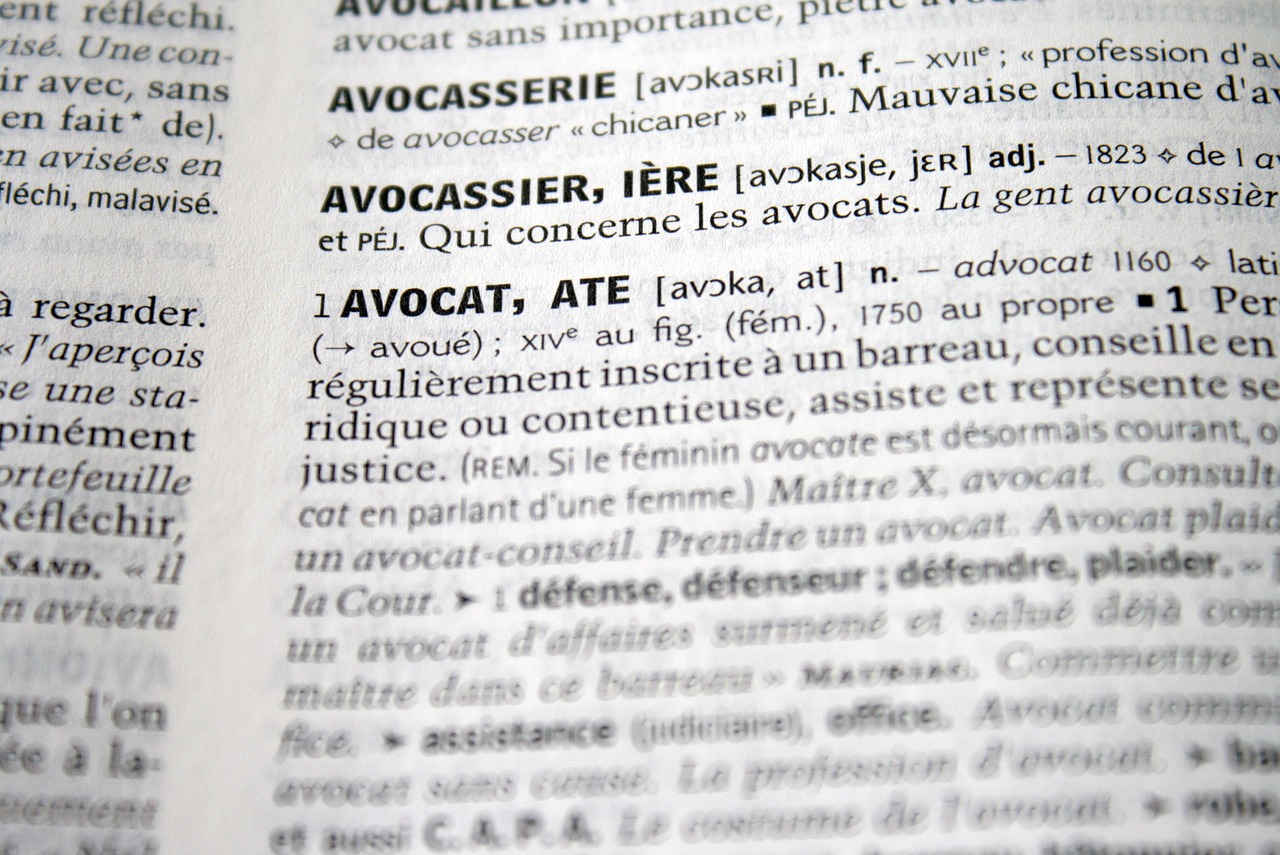
Overlapping Consensus
The concept of is a fascinating aspect of John Rawls' political philosophy that seeks to bridge the gap between diverse moral beliefs in a pluralistic society. Imagine a vast tapestry, woven from the threads of various ideologies, religions, and worldviews. Each thread represents a unique belief system, yet when viewed from a distance, they create a harmonious image. This is the essence of overlapping consensus: different groups can agree on certain political principles even if they disagree on deeper moral issues.
Rawls posits that for a stable and just society to thrive, it is essential for individuals with varying moral perspectives to find common ground. This common ground is not about erasing differences but rather about recognizing that despite our diverse beliefs, we can still support a shared framework of justice. This framework respects individual freedoms while promoting the collective welfare of society. It’s like a potluck dinner where everyone brings their own dish, yet all agree on the importance of sharing a meal together.
To illustrate this, let’s consider a few key principles that often find consensus among different groups:
- Basic Rights and Liberties: Most people agree on the necessity of fundamental human rights, such as freedom of speech and the right to vote.
- Fair Distribution of Resources: There’s a general understanding that resources should be distributed in a way that benefits the least advantaged members of society.
- Rule of Law: The importance of having laws that apply equally to all citizens is a principle that transcends individual beliefs.
By emphasizing overlapping consensus, Rawls provides a way to navigate the complexities of modern democratic societies. Rather than focusing solely on the differences that divide us, this approach encourages dialogue and cooperation. It allows for a political landscape where diverse voices are heard and respected, fostering a sense of unity without sacrificing individual beliefs.
However, it’s crucial to recognize that overlapping consensus is not without its challenges. Critics argue that it may gloss over significant injustices or fail to adequately address the needs of marginalized groups. In a world where radical ideologies and deep-seated divisions exist, the challenge lies in ensuring that the consensus reached is genuinely inclusive and does not reinforce existing power imbalances.
In conclusion, the idea of overlapping consensus is a powerful tool for promoting social harmony in a diverse society. By focusing on shared political principles, we can create a framework that respects individual beliefs while working towards a more just and equitable society. It invites us to engage in conversations that matter and to seek solutions that benefit everyone, reminding us that while our beliefs may differ, our commitment to justice and fairness can unite us.
- What is overlapping consensus? Overlapping consensus refers to the agreement among individuals with differing moral beliefs on certain political principles that can maintain a stable society.
- Why is overlapping consensus important? It fosters cooperation and dialogue in a pluralistic society, allowing diverse groups to work together towards common goals without erasing their differences.
- How does overlapping consensus relate to justice? It provides a framework for achieving justice that respects individual freedoms while promoting the welfare of the community as a whole.

Critiques of Political Liberalism
Political liberalism, while a significant advancement in political theory, is not without its critics. One of the primary concerns is that it may inadequately address deep-seated injustices present in society. Critics argue that merely advocating for a pluralistic society, where diverse beliefs coexist peacefully, does not ensure that all voices are heard equally. In reality, systemic inequalities often mean that certain groups dominate discussions, leaving marginalized communities at a disadvantage.
Moreover, the framework of political liberalism assumes a level of rational discourse among citizens that may not exist in practice. This idealistic view can be seen as an oversimplification of the complexities of human interactions and the power dynamics at play. For instance, if individuals are unable to engage in meaningful dialogue due to historical grievances or socio-economic disparities, the notion of an overlapping consensus becomes problematic. The expectation that all parties can come together to form a stable agreement may overlook the fact that some groups may be fighting for basic recognition or rights rather than merely negotiating political principles.
Another critique centers on the effectiveness of political liberalism in confronting radical ideologies. While it promotes tolerance and respect for diverse beliefs, critics suggest that this approach may fall short in addressing the challenges posed by extremist views that reject the very foundations of liberalism. In situations where radical ideologies threaten social cohesion, the reliance on consensus and dialogue may not suffice. Instead, some argue that a more robust response is necessary—one that actively challenges and counters extremist narratives while promoting a more equitable society.
Furthermore, the focus on individual freedoms within political liberalism can sometimes overshadow collective responsibilities. Critics assert that an overemphasis on personal liberty may lead to a neglect of social obligations, creating a society where individuals prioritize self-interest over community welfare. This can perpetuate existing inequalities and undermine the very principles of justice and fairness that political liberalism aims to uphold.
In light of these critiques, it becomes essential to engage in a deeper examination of political liberalism's tenets. Acknowledging its limitations does not necessarily mean dismissing its contributions to political thought; rather, it invites a conversation about how to adapt and strengthen its principles to better address the complexities of contemporary society. The dialogue surrounding political liberalism must evolve to ensure that it remains relevant and capable of fostering a truly just society.
- What is political liberalism? Political liberalism is a philosophical framework that advocates for a pluralistic society where diverse beliefs can coexist, emphasizing respect for individual rights and collective welfare.
- What are the main critiques of political liberalism? Critics argue that it may not adequately address deep-seated injustices, oversimplifies human interactions, and struggles to confront radical ideologies.
- How does political liberalism relate to John Rawls' philosophy? Political liberalism builds on Rawls' ideas of justice as fairness, focusing on creating a shared political framework that respects diversity while promoting social justice.
- Can political liberalism effectively promote social justice? While it aims to do so, critics contend that it must evolve to address systemic inequalities and ensure that all voices are heard in the political discourse.
Frequently Asked Questions
- What is the main idea behind John Rawls' concept of justice as fairness?
Rawls' concept of justice as fairness revolves around the idea that societal structures should be designed to ensure fairness and equality. It advocates for balancing individual freedoms with the community's needs, ultimately striving for a just society where everyone has equal opportunities.
- Can you explain the original position and its significance?
The original position is a hypothetical scenario where individuals decide on principles of justice while behind a veil of ignorance. This means they do not know their social status, wealth, or personal characteristics. The significance lies in its ability to promote impartiality and fairness, as decisions made under these conditions are likely to be more just and equitable.
- What is the veil of ignorance, and how does it work?
The veil of ignorance is a thought experiment that strips away personal biases, compelling individuals to design a just society without any knowledge of their own circumstances. This ensures that the principles established are fair and equitable, as they are created without self-interest or favoritism.
- How does Rawls' philosophy challenge traditional social contract theories?
Rawls' approach shifts the focus from self-interest, which is often emphasized in traditional social contract theories, to fairness and equality. By prioritizing justice as fairness, Rawls reshapes our understanding of moral and political obligations, especially in a diverse society where various beliefs and values coexist.
- What are the two principles of justice articulated by Rawls?
Rawls outlines two key principles of justice: first, that everyone should have equal basic liberties; and second, that social and economic inequalities should be arranged to benefit the least advantaged members of society. These principles guide policies aimed at promoting equity and social justice.
- What is political liberalism in the context of Rawls' philosophy?
Political liberalism builds on Rawls' ideas by advocating for a pluralistic society where diverse beliefs can coexist. It emphasizes the need for a shared political framework that respects individual freedoms while also promoting the collective welfare of the community.
- What does overlapping consensus mean?
Overlapping consensus refers to the idea that individuals with differing moral views can still agree on certain political principles. This concept fosters a stable society that respects diversity while upholding justice and fairness, allowing for coexistence despite varying beliefs.
- What are some critiques of Rawls' veil of ignorance?
Critics argue that the veil of ignorance may oversimplify the complexities of social dynamics. They question whether it truly addresses issues of power, privilege, and systemic inequalities, suggesting that it may not fully capture the nuances of real-world injustices.
- How do critics view political liberalism?
Critics of political liberalism contend that it may fall short in addressing deep-seated injustices and could be inadequate in providing comprehensive solutions to the challenges posed by radical ideologies and societal divisions. They argue that it needs to more effectively tackle these pressing issues.

